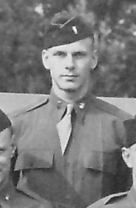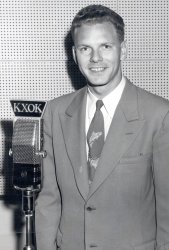 Army
Signal OCS Class 42-09 was the largest ever OCS class. It enjoyed 1,605
graduates out of a starting class of 3,200. That’s a 49.8% attrition
rate folks. For those of you who didn’t think that Army Signal OCS back
during WWII was grueling, consider those statistics.
Army
Signal OCS Class 42-09 was the largest ever OCS class. It enjoyed 1,605
graduates out of a starting class of 3,200. That’s a 49.8% attrition
rate folks. For those of you who didn’t think that Army Signal OCS back
during WWII was grueling, consider those statistics.
The photo of Candidate Hille’s class shows only one
section of his class (see bottom of Class Page for full Class Picture).
Peter Hille, Candidate Hille’s son, is working on a
bit of additional information about his Dad’s time in the service and
his life. For the moment he has supplied us with the following
information:
After graduating from OCS, Candidate Hille received
numerous assignments, as most did during the hectic days of WWII. By the
time he settled in, he found himself serving as Aide de Camp to General
Homer, first with Pacific Coastal Artillery Defense HQ in San Francisco,
and later in the Panama Canal Zone. By the end of the war 2nd Lieutenant
Hille had reached the rank of Major.
At the time this information was submitted former
Candidate Hille was living in St. Louis, and had just celebrated his
93rd birthday, on the 10th of February, 2012. Peter says his Dad has
“been in pretty good health although declining energy, [and is] still
very much himself.”
Peter says his Dad did tell some stories about his
time at OCS, and he would try to capture a few and forward them to us.
One story his Dad told was about when the unit he was in took some of
the "90 day wonders" to participate in an archery match against a team
at Swarthmore College. Peter’s Mom was on the Swarthmore team. As
the family likes to say, “apparently Cupid got a few arrows fired off
that night too.”
 Peter says his Dad said that OCS was a pivotal and
transformative experience for him. He often spoke of it as Peter was
growing up. “I know it helped to shape him and, by extension, me.”
Peter says his Dad said that OCS was a pivotal and
transformative experience for him. He often spoke of it as Peter was
growing up. “I know it helped to shape him and, by extension, me.”
Peter went on to say that his “Dad was in radio
before the war in the early days, probably part of how he ended up in
the Signal Corps. He returned to broadcasting after the war, first at
KXOK in St. Louis, then at KSD, which became KSD-TV (the local NBC
affiliate). Dad did the 10:00 news for many years on TV and continued as
an announcer in radio also. He also ran a small recording studio in our
basement, so I grew up amidst vacuum tubes, cables and the smell of hot
solder. I learned early on that if something didn't work, you took it
apart and fixed it, and if you didn't understand it you got a manual and
figured it out.”
Doing a bit of research about Candidate Hille, we
found an article by the St. Louis Journalism Review. Originally
published in March 2009, the article quotes from Hille about his career
as a TV announcer:
“As a night announcer, Hille was required to do
station breaks, news cut-ins and commercials. ‘If a half-hour program
was on the air, you sat and, theoretically, studied your script, which
is a laugh. Almost all our commercials were done live, since there were
few recordings. Those would have to be done on disc, which was
expensive. We did 15 minutes of news at 6 and again at 10, and a
sign-off news at midnight.’
“Later, after he was hired as a full-time announcer,
Bob Hille was made host of a daily remote broadcast from various grocery
stores where he would conduct a live quiz with shoppers. The program was
sponsored by Forbes Coffee Company. After awhile he hosted a daily
half-hour luncheon show at the Forest Park Hotel, which would feature
celebrity guests.
“There were seven or eight radio stations serving
the St. Louis audience in the late 1930s, and Hille says the big
difference in the stations was determined by whether the station had a
network affiliation. ‘NBC was split into the Red and Blue networks at
that time. We had the Blue. KSD had the Red, which was the premier. KMOX
had CBS. KWK, with Mutual, was not as big. So that made KSD an even
bigger competitor for KXOK, and in this case, the competition was
accelerated because of the personal competition between the newspapers'
publishers.'
“That competition even spread to talent raids. In
1951, Bob Hille was hired away from KXOK to work as an announcer at KSD
and KSD-TV.”


